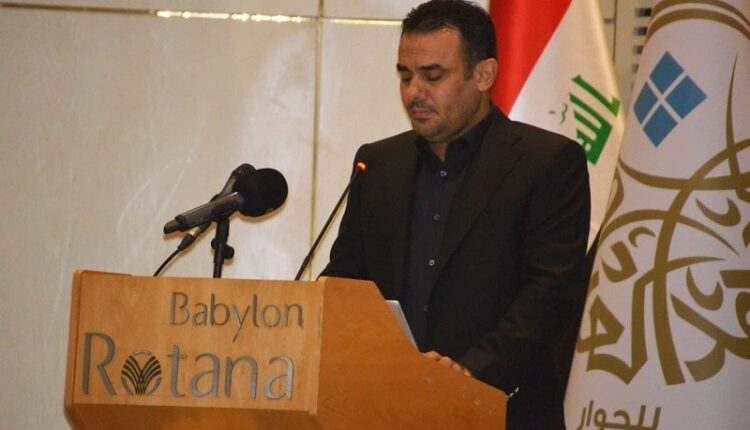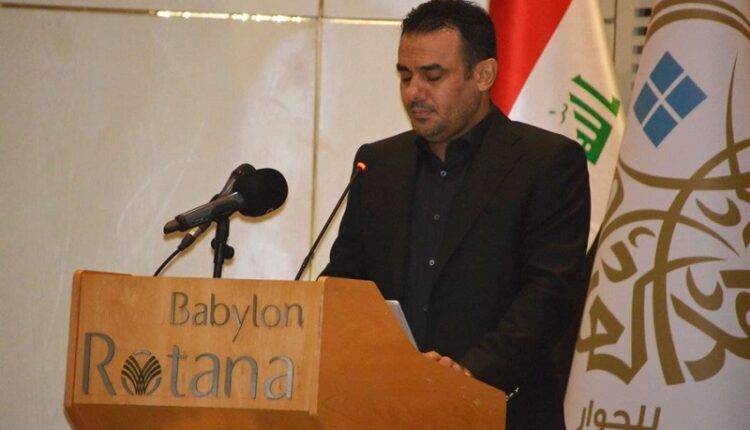Empowering Iraq’s Transformation: From Fragility to an Active and Influential State: Insights from the Inaugural Address at the Fourth International Baghdad Dialogue Conference

The Fourth International Baghdad Dialogue Conference commenced with an inaugural address delivered by Mr. Abbas Radi Al-Amiri, Director of the Iraqi Institute for Dialogue and Executive Director of the Baghdad Dialogue Conference.
The question of how Iraq can evolve into a significant regional player has arisen. Although it is disheartening to grieve the loss of a loved one, it is an inevitable part of life. Describing one’s country, homeland, and cherished abode as fragile, weak, or failed is truly saddening. However, it is a stark reality, my esteemed colleagues. There are international benchmarks that countries seeking to emerge from the depths of fragility, weakness, and failure cannot afford to overlook. Regrettably, Iraq has found itself entrenched in varying degrees of weakness, persistently labeled as such on the global stage.
The dynamics of regional politics and the interplay between major forces have transformed Iraq into a region struggling for influence. This struggle impedes Iraq’s ability to reconcile the conflicting values of neighboring countries and hampers its potential to become a hub for settlement, given the prevailing zero-sum equation that governs the intentions of neighboring nations.
What matters most, however, is not bemoaning the ruins or lamenting fate, for we, as the intellectual elite, possess the power to shape the narrative. The Iraqi elite now stands at a historic juncture, with the opportunity to steer Iraq towards becoming a domestically and internationally effective state that harmonizes with its global environment and actively engages with it. This necessitates adopting a mindset that embraces the utilization and creation of opportunities within a turbulent environment, liberating Iraq from the confines of rigid thinking imposed by the post-2003 political system and embracing a new paradigm that emphasizes bolstering Iraq’s image as a nation of significant standing, capable of surmounting the challenges that have accompanied its existence and endurance.
For an entire year, the Iraqi Institute for Dialogue has tirelessly crafted a comprehensive strategy aimed at transforming Iraq into an active state and extricating it from the quagmire of failure, weakness, and fragility that foreign policies have woven. The inherent clash of interests within the regional environment surrounding Iraq seeks to perpetuate the country’s fragility, providing greater opportunities for vested interests to flourish and reinforcing the existing value conflicts upon which the regional states’ foundations are built. Consequently, Iraq’s transformation into an active state would profoundly impact the continuity of existing ruling regimes in the region. Historically, Iraq has struggled to attain sustainable stability, as witnessed by its regional counterparts. This can be attributed, in part, to the link between the presence of these regimes and the fragility of Iraq’s situation, undermining its efficacy as an active regional player.
Declassified documents from the United States have revealed that 14 Arab, regional, and international intelligence institutions actively work to prevent Iraq from becoming a stable economic market or a secure environment. These actions are justified by various reasons and considerations deemed to serve their respective national interests. The interpretation of regional strategies revolves around the extent to which Iraq’s neighboring countries can seize opportunities. Iraq’s transformation into an economically and security-oriented nation would diminish its competitive advantage associated with fragility.
Iraq possesses crucial characteristics that render it a focal point for countries with major security strategies in the region, particularly superpowers. Paradoxically, the countries that inflict the most pain upon Iraq are those with whom its people share blood, religion, language, brotherhood, and destiny. The intelligence services of these nations have diligently worked to impede any positive steps taken by Iraq, ensuring it does not become an international gateway, a global oil market, or an integral part of the Silk Road, particularly through its seaport and dry canal connecting it to Europe.
Iraq’s significance lies in its geopolitical advantages, which draw considerable attention from major nations. However, the power dynamics
within the region dictate that any effective role played by Iraq in its regional neighborhood undermines its competitive advantage. Consequently, these countries actively seek ways to diminish the value of Iraq’s advantages by implementing strategic projects that establish new advantages for themselves while depriving Iraq of the opportunity to leverage its capabilities. This perpetual state of fragility prevents Iraq from effectively employing its geopolitical advantages in the international arena.
But what defines a failed state? A state becomes a failure when it loses its authority and ability to exercise effective control over its territory, including the monopoly of violence within its borders. It becomes fragile and weak when it loses its legitimacy in formulating and implementing public decisions, as well as when it fails to provide essential public services or actively engage as a productive member of the international community.
In a report published by “Foreign Policy” magazine in collaboration with the “Fund for Peace Organization” in 2014, Iraq ranked 13th among the most weakened countries in the world, based on 12 key criteria measuring the extent of their failure. These criteria encompass political indicators such as the erosion of state legitimacy due to corrupt ruling elites, lack of transparency and accountability, distrust in official institutions, absence of fair application of the rule of law, prevalence of human rights violations, security challenges, and the potential for civil war. Economic indicators encompass the absence of sustainable economic development among diverse groups, decline in major indicators like national income, trade balance, and currency exchange rates. Social indicators focus on mounting demographic pressures and the influx of individuals and refugees due to negative and haphazard movements.
Reshaping the political, economic, and social factors that govern state performance is a crucial criterion for transitioning Iraq from a fragile state to an active one. Additionally, recalibrating opportunities that can be harnessed or created within the regional and international environment is paramount. Iraq’s unique advantages position it well to assume this role, but it requires the expertise and commitment of the Iraqi elite to embrace this goal as a guiding principle for decision-making.
The Fourth Baghdad International Dialogue serves as a platform for political elites who believe in Iraq’s capacity to leverage its resources and reevaluate regional interactions. Seizing opportunities demands deliberate choices marked by wisdom, realism, and a profound understanding of the dynamics and interests at play in the regional and international arenas.
Furthermore, it is essential to acknowledge that the path to transforming Iraq into an active state goes beyond shedding tears over its past misfortunes or relying on luck. As intellectual elites, we hold the power to shape the trajectory of our nation. The Iraqi elite must seize this historic opportunity and steer Iraq towards becoming an internally and externally effective state, in sync with the international environment and actively engaged with it.
This transformation necessitates adopting a logical and forward-thinking approach in a turbulent environment. We must break free from the constraints of rigid thinking imposed by the post-2003 political system and embrace a new paradigm that highlights fresh perspectives. By reinforcing Iraq’s image as a resilient nation that has overcome challenges and thrived against all odds, we can enhance its standing on the global stage.
For an entire year, the Iraqi Institute for Dialogue has dedicated itself to formulating a comprehensive strategy aimed at guiding Iraq’s transformation into an active state. This strategy seeks to break free from the shackles of failure, weakness, and fragility imposed by foreign policies. The conflicting interests within the regional environment surrounding Iraq aim to perpetuate its fragility, enabling external actors to exploit their own interests and impeding Iraq’s ability to harness its potential. By becoming an active state, Iraq would disrupt the status quo and significantly impact the existing ruling regimes in the region.
Declassified documents from the United States have exposed the concerted efforts of 14 Arab, regional, and international intelligence institutions striving to hinder Iraq’s stability as an economic market and a secure environment. These actions are driven by their perception of these measures serving their respective national interests. Therefore, it is imperative to understand that Iraq’s transformation into an economically and security-oriented nation would undermine its competitive advantage associated with fragility.
Iraq’s geopolitical advantages have made it a focal point for major countries with security strategies in the region, including superpowers. Paradoxically, the nations that share cultural, religious, and historical ties with Iraq have played a significant role in its struggles. The intelligence services of these countries have relentlessly worked to undermine Iraq’s progress, preventing it from becoming an international gateway, a thriving oil market, or a key player in the Silk Road. Their actions aim to diminish the value of Iraq’s unique advantages and keep it trapped in a perpetual state of fragility.
It is crucial to recognize that Iraq’s journey towards becoming an active state cannot be accomplished without addressing the underlying power dynamics within the region. These dynamics dictate that any effective role played by Iraq threatens the competitive advantage of other regional players. Therefore, it is incumbent upon us to navigate this landscape with wisdom, realism, and a deep understanding of the interests at stake.
In conclusion, the Fourth Baghdad International Dialogue provides a platform for political elites committed to realizing Iraq’s potential by leveraging its resources and reshaping regional interactions. To seize opportunities, we must make deliberate choices, guided by a logical understanding of the complex dynamics in regional and international environments. By doing so, we can pave the way for Iraq’s transformation from a fragile state to an active and influential player on the global stage.


